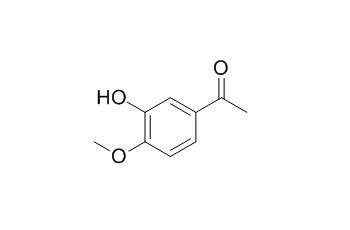Isoacetovanillone
Isoacetovanillone shows anti-inflammatory potential.
Inquire / Order:
manager@chemfaces.com
Technical Inquiries:
service@chemfaces.com
Tel:
+86-27-84237783
Fax:
+86-27-84254680
Address:
1 Building, No. 83, CheCheng Rd., Wuhan Economic and Technological Development Zone, Wuhan, Hubei 430056, PRC
Providing storage is as stated on the product vial and the vial is kept tightly sealed, the product can be stored for up to
24 months(2-8C).
Wherever possible, you should prepare and use solutions on the same day. However, if you need to make up stock solutions in advance, we recommend that you store the solution as aliquots in tightly sealed vials at -20C. Generally, these will be useable for up to two weeks. Before use, and prior to opening the vial we recommend that you allow your product to equilibrate to room temperature for at least 1 hour.
Need more advice on solubility, usage and handling? Please email to: service@chemfaces.com
The packaging of the product may have turned upside down during transportation, resulting in the natural compounds adhering to the neck or cap of the vial. take the vial out of its packaging and gently shake to let the compounds fall to the bottom of the vial. for liquid products, centrifuge at 200-500 RPM to gather the liquid at the bottom of the vial. try to avoid loss or contamination during handling.
Research Square2024, rs-4398438
Antioxidants (Basel).2022, 11(8):1471.
Drug Test Anal.2018, 10(10):1579-1589
Cell Commun Signal.2024, 22(1):597.
Plants (Basel).2021, 10(6):1192.
Environ Toxicol.2024, 39(4):2417-2428.
J Ethnopharmacol.2020, 269:113752.
Pharmaceutics.2022, 14(12):2765.
J of Ana. Chem.2019, 74(11):1113-1121
Biomolecules.2022, 12(12):1754.
Related and Featured Products
Res Pharm Sci. 2015 Jul-Aug;10(4):345-55.
Anti-inflammatory effect of Pycnocycla spinosa extract and its component isoacetovanillone on acetic acid induced colitis in rats.[Pubmed:
26600861 ]
Colitis is an inflammatory disease of the intestine with unknown etiology involving multiple immune, genetic and environmental factors. We were interested to examine the effect of total extract from Pycnocycla spinosa Boiss. on the treatment of experimental colitis. Mediators involved in colonic inflammation are prostaglandins, interleukins, leukotriene as well as an increase in myeloperoxidase (MPO) activity.
METHODS AND RESULTS:
Therefore, MPO activity was also determined in this research. P. spinosa hydroalcoholic extract (5, 10 and 20 mg/kg) or Isoacetovanillone (2, 5 and 10 mg/kg) were administered orally, started 2 h before induction of colitis by intrarectal administration of acetic acid (3%) in rats. Prednisolone (4 m/kg) was used as the standard drug for comparison. Biochemical evaluation of inflamed colon was done using assay of MPO activity. After 5 days treatments, mucosal ulceration was evaluated. Intrarectal instillation of acetic acid caused significant inflammatory reactions as indicated by macroscopic and microscopic changes. The activity of MPO increased in vehicle treated groups while recovered to normal level by pretreatment of animals with P. spinosa extract, Isoacetovanillone and prednisolone. P. spinosa and Isoacetovanillone-treated groups showed significantly lower score values of macroscopic and microscopic characters when compared with the vehicle treated negative control group. The beneficial effect of P. spinosa was comparable with that of prednisolone.
CONCLUSIONS:
This research has shown the anti-inflammatory potential of P. spinosa extract and Isoacetovanillone in experimentally induced colitis.



